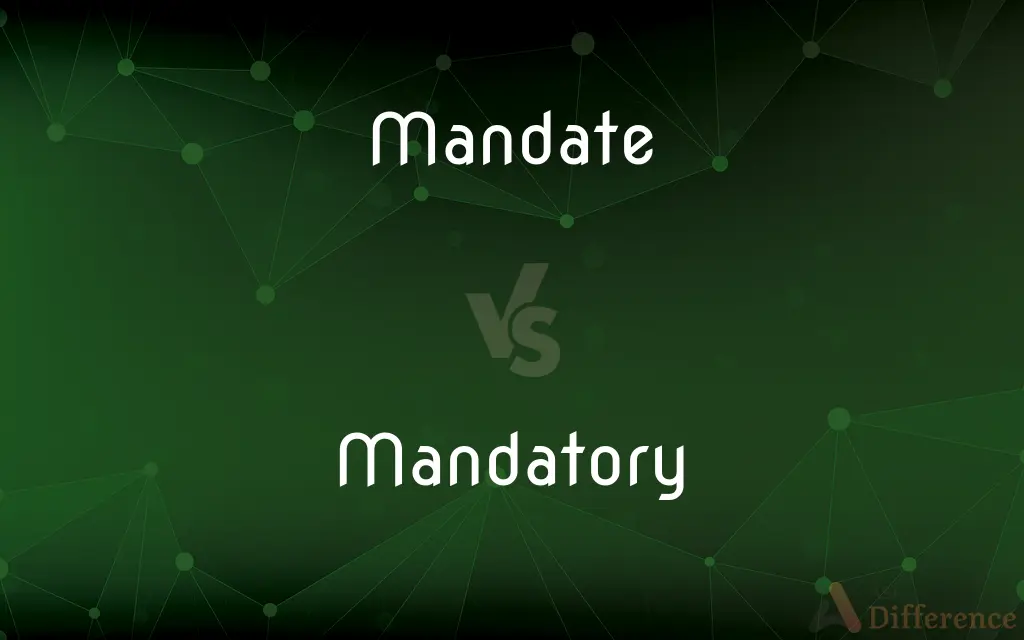Mandate vs. Mandatory — What's the Difference?
By Fiza Rafique & Urooj Arif — Updated on April 3, 2024
A mandate is an official order or commission to do something, often given by voters to elected officials, while mandatory refers to something required by law or rules, compulsory in nature.

Difference Between Mandate and Mandatory
Table of Contents
ADVERTISEMENT
Key Differences
A mandate involves an authoritative command or instruction, typically from a higher authority or the electorate, granting permission or directions to carry out specific acts. It often implies a level of trust and responsibility placed upon the recipient of the mandate to execute a certain task or policy. On the other hand, mandatory denotes an obligation, something that must be done because it is required by law, regulations, or rules. It is not a request but a requirement, carrying implications of enforcement and penalties for non-compliance.
In the political context, a mandate is given to elected officials by their constituents, reflecting the voters' endorsement of the officials' proposed policies or actions. This is a symbolic grant of authority, suggesting public support for certain actions or legislative agendas. Conversely, laws or regulations described as mandatory are universally applicable, not subject to individual approval or acceptance, and must be followed as a matter of legal or procedural necessity.
A mandate can be broad or specific, outlining general guidelines or detailed instructions, but it ultimately serves as a directive aimed at achieving certain goals or implementing policies. Mandatory measures, however, detail specific actions or standards that individuals, organizations, or governments must adhere to, often to ensure safety, compliance, or fairness.
The effectiveness of a mandate can sometimes be debated, as it relies on the perceived legitimacy and support from those who issued it. In contrast, the effectiveness of mandatory rules or regulations is often gauged by compliance rates and the ability to enforce them. Compliance is not optional but required, with mechanisms in place to ensure adherence.
While mandates often require a certain degree of interpretation and flexibility in their execution, mandatory requirements are typically clear and unequivocal. The former allows for some discretion in how objectives are achieved, whereas the latter specifies exactly what is required, leaving little room for deviation.
ADVERTISEMENT
Comparison Chart
Nature
An authoritative order or instruction.
Required by law, rules, or regulations; compulsory.
Source
Higher authority, electorate.
Laws, policies, governing bodies.
Flexibility
Can offer some discretion in execution.
Specific requirements with little to no flexibility.
Enforcement
Relies on the legitimacy and support for effectiveness.
Enforced through legal or regulatory mechanisms.
Application
Political directives, organizational missions.
Safety regulations, legal obligations, procedural rules.
Compare with Definitions
Mandate
An official order to perform a particular task.
The committee was given a mandate to reform the education system.
Mandatory
Required by law or rules; compulsory.
Attendance at the meeting is mandatory for all members.
Mandate
A commission to act on behalf of another.
The agency operates under a mandate to protect wildlife.
Mandatory
Obligatory, not optional.
Wearing helmets while biking is mandatory in many cities.
Mandate
An instruction from a higher authority.
The mandate required the city to update its infrastructure.
Mandatory
Enforceable by authority; necessary.
The company made it mandatory to complete ethics training.
Mandate
Authority granted by voters to a party or candidate.
The president claimed a strong mandate from the electorate.
Mandatory
A stipulation that must be followed.
The law makes it mandatory for cars to have seat belts.
Mandate
Directive based on authority or trust.
The board’s mandate emphasized sustainable growth.
Mandatory
Required as a standard.
Submitting a thesis is mandatory for graduation.
Mandate
An authoritative command or instruction.
Mandatory
Required by law or mandate; compulsory
Wearing helmets was made mandatory for pedal cyclists
Mandate
A command or authorization given by a political electorate to the winner of an election.
Mandatory
Variant spelling of mandatary
Mandate
A commission from the League of Nations authorizing a member nation to administer a territory.
Mandatory
Required or commanded by authority; obligatory
Attendance at the meeting is mandatory.
Mandate
A region under such administration.
Mandatory
Of, having the nature of, or containing a mandate.
Mandate
(Law) The specific directive issued by a reviewing court to a lower court, as in requiring the lower court to enter a new judgment or to conduct further proceedings consistent with the reviewing court's ruling.
Mandatory
Holding a League of Nations mandate over a territory.
Mandate
To assign (a colony or territory) to a specified nation under a mandate of the League of Nations.
Mandatory
A mandatary.
Mandate
To make mandatory, as by law; decree or require
Mandated desegregation of public schools.
Mandatory
Obligatory; required or commanded by authority.
Attendance at a school is usually mandatory for children.
Mandate
An official or authoritative command; an order or injunction; a commission; a judicial precept; an authorization.
Mandatory
Of, being or relating to a mandate.
Mandatory Palestine
Mandate
(politics) The order or authority to do something, as granted to a politician by the electorate.
Mandatory
(disc golf) A sign or line that require the path of the disc to be above, below or to one side of it.
Mandate
(Canada) A period during which a government is in power.
Mandatory
A person, organisation or state who receives a mandate; a mandatary.
Mandate
(historical) An order by the League of Nations to a member nation to establish a government responsible for a conquered territory, as the colonies of Germany after World War I.
Mandatory
Containing a command; preceptive; directory.
Mandate
(historical) Such a territory.
Mandatory
Obligatory; compulsory; required by authority.
Mandate
(uncommon) man date: a date between two men.
Mandatory
Not optional; not able to be modified or disregarded; as, seven mandatory clauses in the contract.
Mandate
To authorize.
Mandatory
Same as Mandatary.
Mandate
To make mandatory.
Mandatory
The recipient of a mandate
Mandate
An official or authoritative command, order, or authorization from a superior official to a subordinate; an order or injunction; a commission; a judicial precept.
This dream all-powerful Juno; I bearHer mighty mandates, and her words you hear.
Mandatory
A territory surrendered by Turkey or Germany after World War I and put under the tutelage of some other European power until they ar able to stand by themselves
Mandate
An authorization to carry out a specific public policy, given by the electorate to their representatives; - it is considered to be implied by the election of a candidate by a significant margin after that candidate has campaigned with that policy as a prominent element of the campaign platform.
Mandatory
Required by rule;
In most schools physical education are compulsory
Attendance is mandatory
Required reading
Mandate
Authorization by a multinational body to a nation to administer the government and affairs of a territory, usually a former colony; as, termination of the British mandate in Palestine.
Mandate
A rescript of the pope, commanding an ordinary collator to put the person therein named in possession of the first vacant benefice in his collation.
Mandate
A contract by which one employs another to manage any business for him. By the Roman law, it must have been gratuitous.
Mandate
A document giving an official instruction or command
Mandate
A territory surrendered by Turkey or Germany after World War I and put under the tutelage of some other European power until they ar able to stand by themselves
Mandate
The commission that is given to a government and its policies through an electoral victory
Mandate
Assign under a mandate;
Mandate a colony
Mandate
Make mandatory;
The new director of the schoolbaord mandated regular tests
Mandate
Assign authority to
Common Curiosities
How are mandates issued?
Mandates are issued by higher authorities such as governments, electorates, or organizational bodies, often as directives or permissions to undertake certain actions.
What is a mandate?
A mandate is an authoritative command, often given by the electorate to elected officials, to carry out specific policies or actions.
Is compliance with a mandate optional?
Compliance with a mandate is expected as it reflects a directive from a higher authority or the electorate, but its enforceability may vary compared to mandatory requirements which carry legal obligations.
What makes something mandatory?
Something is made mandatory by laws, regulations, or policies that require adherence and establish penalties for non-compliance.
What does mandatory mean?
Mandatory refers to something that is required by law, rules, or regulations and must be complied with.
Can a mandate become mandatory?
A mandate can lead to the creation of mandatory laws or regulations if the directive is formalized into a legal requirement.
Can a law be a mandate?
While laws can embody the spirit of a mandate by reflecting voters' wishes, the term "mandate" is typically used to describe the broader authority or approval given by the electorate, whereas laws are specific and mandatory obligations.
Who enforces mandatory requirements?
Mandatory requirements are enforced by relevant authorities, such as government agencies, regulatory bodies, or institutional governance structures.
Why are some rules made mandatory?
Rules are made mandatory to ensure safety, compliance, fairness, or efficiency within a society, organization, or system, often reflecting collective needs or values.
What happens if mandatory rules are not followed?
Non-compliance with mandatory rules typically results in penalties, legal action, or other forms of disciplinary measures, depending on the severity and context of the violation.
How does public support affect the implementation of a mandate?
Public support can significantly affect the implementation of a mandate by ensuring cooperation and legitimacy, potentially making it easier to achieve the mandated objectives.
Can an organization issue a mandate?
Yes, organizations can issue mandates as directives to their members or employees to undertake certain actions or adhere to specific policies.
Are all governmental directives considered mandates?
Not all governmental directives are considered mandates; some are specific orders or regulations that are mandatory and not subject to electoral endorsement.
How do international mandates work?
International mandates are issued by global or regional bodies to member states or organizations, directing them to carry out actions or adhere to standards with varying degrees of enforceability.
What is the difference between a legal mandate and a mandatory law?
A legal mandate can refer to a directive with broad support or authority to act on specific issues, while a mandatory law is a specific legal requirement that must be followed.
Share Your Discovery

Previous Comparison
Humidity vs. Hygrograph
Next Comparison
Leak vs. LeakageAuthor Spotlight
Written by
Fiza RafiqueFiza Rafique is a skilled content writer at AskDifference.com, where she meticulously refines and enhances written pieces. Drawing from her vast editorial expertise, Fiza ensures clarity, accuracy, and precision in every article. Passionate about language, she continually seeks to elevate the quality of content for readers worldwide.
Co-written by
Urooj ArifUrooj is a skilled content writer at Ask Difference, known for her exceptional ability to simplify complex topics into engaging and informative content. With a passion for research and a flair for clear, concise writing, she consistently delivers articles that resonate with our diverse audience.















































